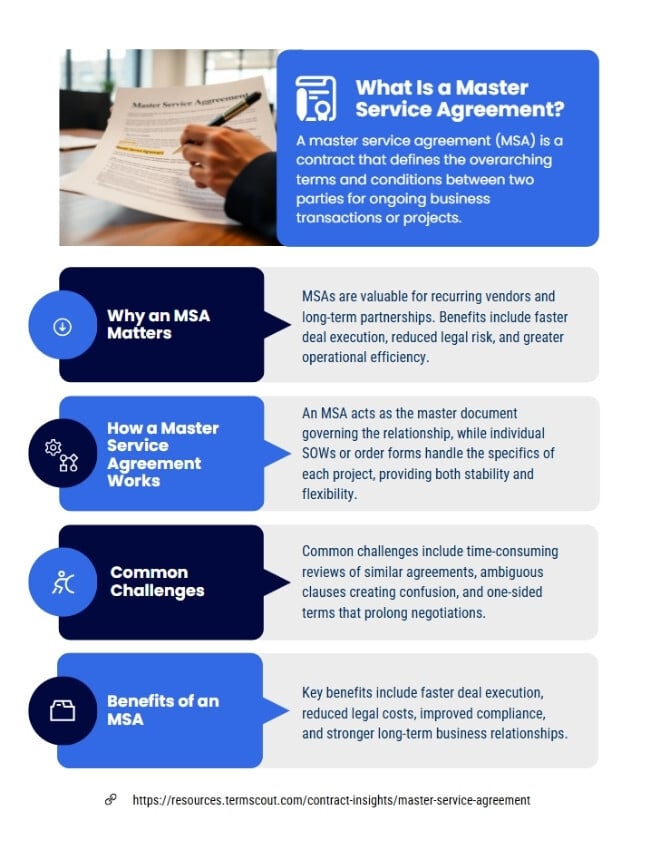What Is a Master Service Agreement?
A master service agreement (MSA) is a contract that defines the overarching terms and conditions between two parties for ongoing business transactions or projects. Often used in technology, SaaS, and professional services, MSAs provide a framework that simplifies repeat work and reduces the need to renegotiate standard terms for each deal.
Typical provisions in an MSA include:
-
Scope of services or work
-
Payment schedules and billing terms
-
Confidentiality and intellectual property ownership
-
Dispute resolution and governing law
-
Termination rights
Once a master service agreement contract is signed, new projects can be launched quickly under related statements of work (SOWs) or project-specific agreements. This creates consistency, saves time, and reduces legal overhead.
Why an MSA Matters
MSAs are particularly valuable for companies managing recurring vendors, enterprise customers, or long-term partnerships. Benefits include:
-
Faster deal execution: Avoid renegotiating boilerplate terms for every project.
-
Reduced legal risk: Clarify rights and obligations upfront.
-
Greater trust: Standardized agreements demonstrate professionalism and reliability.
-
Operational efficiency: Let teams focus on delivery instead of repetitive paperwork.
How a Master Service Agreement Works
An MSA contract acts as the “master” document that governs the relationship, while individual SOWs or order forms handle the specifics of each project. Together, they provide both stability and flexibility—standard rules combined with project-level customization.
However, many organizations encounter issues such as inconsistent wording across departments or regions, delays caused by redlines on nearly identical contracts, lack of benchmarking against industry norms, and excessive review cycles that slow down negotiations.
Common Challenges in Master Services Agreements
-
Time-consuming reviews: Similar agreements are reviewed repeatedly
-
Ambiguous clauses: Vague terms create confusion or disputes
-
One-sided terms: Imbalanced provisions prolong negotiations
-
Limited visibility: Hard to compare MSA terms against best practices
How Contract Intelligence Supports MSAs
Modern contract intelligence platforms use AI to analyze and benchmark master service agreements at scale. Teams can:
-
Certify™ contracts: Validate whether MSAs align with fairness and market standards
-
Leverage trust badges: Share verified contracts with counterparties to build confidence
-
Run clause-level analysis: Flag non-standard, negotiable, or high-risk provisions instantly
By standardizing master services agreements, companies improve consistency, reduce risk, and speed up deal approval.
MSA vs Master Services Agreement
The terms master service agreement (MSA) and master services agreement are often used interchangeably. Both describe the same type of overarching contract that governs multiple projects or transactions. Whether you refer to it in singular or plural, the purpose remains the same: providing a clear, enforceable framework for long-term business relationships.
Enhance Your Master Service Agreements with TermScout
Streamline your contract process and sales, certify your agreements, boost trust, and increase revenue with TermScout's Contract Intelligence platform. Book a demo today!
Book a Demo

Master Service Agreement FAQs
How is a master service agreement different from a statement of work (SOW)?
The MSA governs the overall relationship, while each SOW defines the specific scope, deliverables, and pricing for an individual project.
What are the benefits of a master services agreement?
Key benefits include faster deal execution, reduced legal costs, improved compliance, and stronger long-term business relationships.
What clauses are usually included in an MSA?
Common provisions include scope of services, payment terms, confidentiality, dispute resolution, liability limitations, and termination rights.
Is an MSA legally binding?
Yes. An MSA is a legally binding agreement that establishes enforceable obligations, even if the detailed project work is handled through separate SOWs.